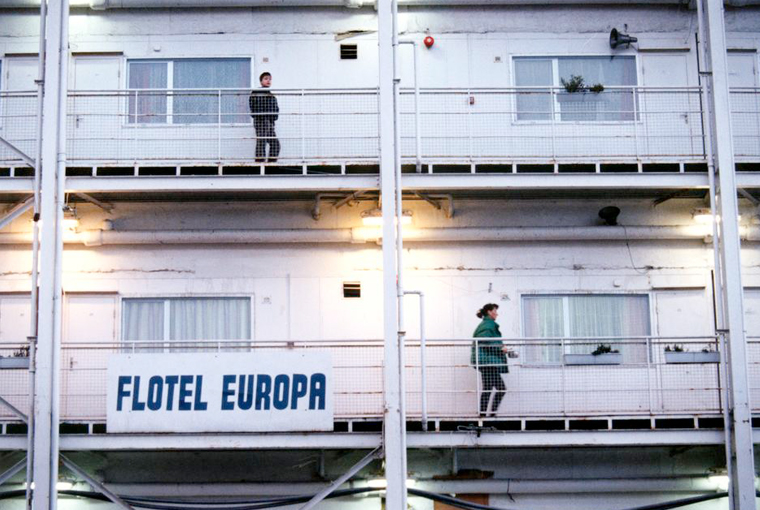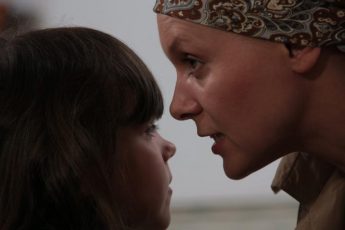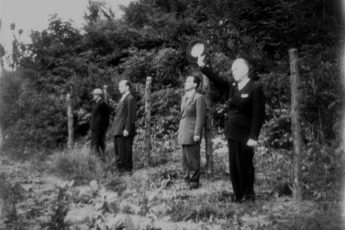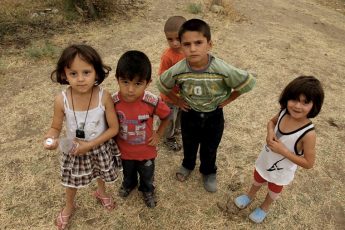Floating Towards Responsibility
Vladimir Tomić’s Flotel Europa (2015)
Vol. 66 (Summer 2016) by Zoe Aiano
A child’s eye view of traumatic events is a time tested approach for offering an engaging take on an unpalatable subject. Vladimir Tomić’s autobiographical documentary Flotel Europa proves to be further confirmation of this, blending sentimental humor and tragedy in a personal take on the Balkan war and life as a refugee. The eponymous “Flotel” is a giant waterborne housing facility assigned to around 1000 Bosnians who fled to Denmark during the conflicts of the 1990s, including Tomić, his mother and his brother. Except for a few instances of archive material taken from fiction film, the visuals consist entirely of the VHS home movies shot by one of the Flotel’s residents, partly as documentation and partly as messages to send back home. Tomić provides a droll and evocative commentary, drawing on his childhood experiences and the rites of passage he lived out in the implausible microcosm offered by the boat.
The 12 year-old Tomić is initially disappointed to learn the family won’t be taking their usual trip to the Croatian seaside this year, but is thrilled at the prospect of living on the high seas indefinitely (when he asks his brother what asylum is, he replies “a bit like going to the seaside but in the North”). On the boat, he makes new friends, goes to school and falls in love. However, the reality of the events going on back home creep in with slow inevitability, instilling incipient tension and corrupting his adolescent idyll. In the context of this nostalgic journey back to a world in grainy 4×3, Tomić’s frankness, ingenuousness and deft touch provide a human, entertaining framework for shedding light on a drastic situation, adding weight to the consequences of war rather than undermining them. The stranger-than-life nature of this story is such that it had to be told, but this approach really allows it to flourish. The pitch is just right, with the conflicting elements skilfully balanced between watchability and social commentary. Similarly, it has the right amount of Balkan zaniness to keep the pace lively without tipping over into crass stereotype.
The film tells its story through a subtle and playful use of duality. Just as the coming of age story is transposed on the backdrop of conflict, the director’s narration navigates spaces visually filtered through the eyes of Toma, another Flotel resident. Masked by the camera he is wielding, he remains hidden and anonymous, though we are given some idea of his personality and interests through his roving zoom (which lingers unsubtly on women’s legs, or whatever else catches his eye). The found footage does not directly illustrate the quintessentially boyish anecdotes being told, and the audience is often left doubting whether the person they are seeing corresponds to the person they are hearing about. Indeed, they often do not, as we learn at the end. The film turns this parallelism into outright juxtaposition at several points, transforming a potential weakness into a strength. In one memorable scene, Tomić recounts an especially embarrassing tale of group masturbation that is set to images of a football match, drawing on obvious but amusing associations related to masculinity, another of the film’s sub-themes. At another point, a montage of traditional Bosnian folk dancing is set to a 90s rock soundtrack, mirroring the constructed images of his homeland to which Tomić is exposed during his time in exile.
At the same time as addressing a crucial moment in history that will continue to benefit from new perspectives for a long time to come, the whole situation bears obvious relevance for our current unprecedented era of migration and asylum seeking. It raises interesting questions regarding what kind of present day Flotel Europas we can expect to learn about in the future, as well as how we will look back at our obsession with self-documentation and our increasingly intimate relationship with audio-visual technology.




Leave a Comment